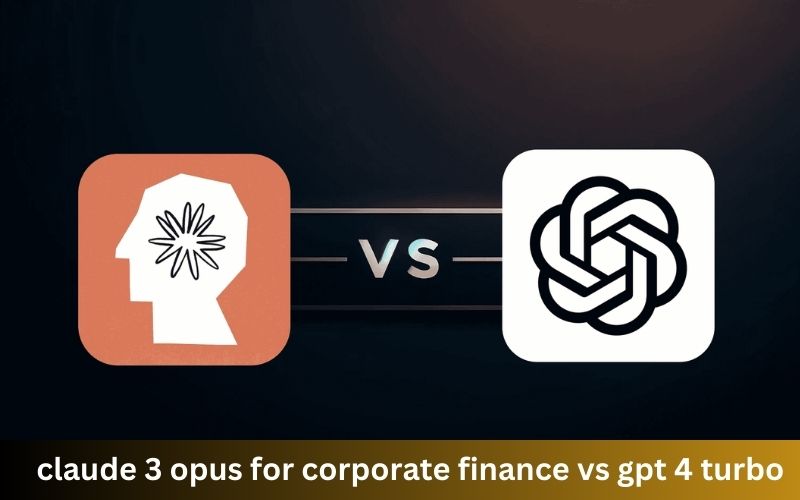In the rapidly evolving world of artificial intelligence, choosing the right tool for corporate finance is crucial. claude 3 opus for corporate finance vs gpt 4 turbo are two leading AI models that promise to revolutionize financial analysis, forecasting, and decision-making. This blog delves into the capabilities, advantages, and unique features of each, providing insights to help you make an informed choice.
1. Overview of Claude 3 Opus
Claude 3 Opus is designed with corporate finance in mind. Developed by Anthropic, this AI model focuses on providing accurate financial forecasts, risk assessments, and strategic insights.
Key Features:
- Financial Forecasting: Claude 3 Opus excels in predicting market trends and financial outcomes with high precision.
- Risk Assessment: The model offers robust risk analysis, identifying potential threats and opportunities in financial markets.
- Strategic Decision-Making: Claude 3 Opus aids in formulating strategic decisions by analyzing complex financial data and trends.
2. Overview of GPT-4 Turbo
GPT-4 Turbo, an advanced version of OpenAI’s renowned language model, brings powerful language processing capabilities to corporate finance. It’s designed to handle large datasets and provide detailed financial insights.
Key Features:
- Natural Language Processing (NLP): GPT-4 Turbo’s NLP capabilities enable it to interpret and generate human-like text, making it ideal for report generation and financial summaries.
- Data Analysis: It can analyze extensive datasets quickly, providing valuable insights and trends.
- Automation: GPT-4 Turbo automates routine tasks, increasing efficiency in financial operations.
3. Financial Forecasting Capabilities
Claude 3 Opus: Claude 3 Opus uses advanced algorithms to provide precise financial forecasts. Its strength lies in its ability to incorporate various economic indicators and historical data to predict future market trends accurately.
GPT-4 Turbo: GPT-4 Turbo leverages its vast training data and sophisticated language models to deliver insightful forecasts. It can analyze textual data, such as news articles and market reports, to provide context-rich predictions.
4. Risk Management
Claude 3 Opus: Claude 3 Opus stands out in risk management. Its algorithms can identify potential risks by analyzing market volatility, economic changes, and financial reports, helping businesses mitigate threats effectively.
GPT-4 Turbo: While GPT-4 Turbo is not specifically designed for risk management, it can process large volumes of data to highlight potential risks. Its ability to analyze text data makes it useful for identifying emerging threats in news and financial reports.
5. Strategic Decision-Making
Claude 3 Opus: Claude 3 Opus excels in strategic decision-making by providing actionable insights. It evaluates multiple scenarios and their potential impacts, helping businesses choose the best course of action.
GPT-4 Turbo: GPT-4 Turbo supports strategic decisions by generating detailed reports and summaries. It can present data in an easily understandable format, aiding executives in making informed choices.
6. User Experience and Integration
Claude 3 Opus: Claude 3 Opus offers a user-friendly interface tailored for finance professionals. Its integration capabilities allow seamless incorporation into existing financial systems, ensuring smooth workflows.
GPT-4 Turbo: GPT-4 Turbo provides a versatile interface that can be adapted for various applications, including finance. Its API allows easy integration with other software, enhancing its utility in diverse corporate environments.
7. Automation and Efficiency
Claude 3 Opus: Claude 3 Opus automates complex financial analyses, reducing manual effort and increasing efficiency. Its ability to handle routine tasks allows finance teams to focus on strategic initiatives.
GPT-4 Turbo: GPT-4 Turbo’s automation capabilities extend to generating reports, analyzing data, and even creating financial documents. This reduces the workload on finance professionals and speeds up operations.
8. Cost and Accessibility
Claude 3 Opus: Claude 3 Opus is positioned as a premium solution, reflecting its specialized capabilities in corporate finance. Its pricing may be higher, but it offers significant value for businesses seeking precise financial insights.
GPT-4 Turbo: GPT-4 Turbo, while also a high-end solution, provides a broader range of applications beyond finance. Its cost-effectiveness lies in its versatility, making it a valuable investment for companies with diverse AI needs.
Conclusion
Choosing between claude 3 opus for corporate finance vs gpt 4 turbo depends on your specific needs in corporate finance. Claude 3 Opus is tailored for detailed financial forecasting, risk assessment, and strategic decision-making, making it ideal for finance-specific tasks. GPT-4 Turbo, on the other hand, offers robust natural language processing, extensive data analysis, and versatile automation, suitable for a wide range of applications.
Both AI models claude 3 opus for corporate finance vs gpt 4 turbo bring unique strengths to the table. By understanding their capabilities, you can select the tool that best aligns with your business goals and operational needs.




